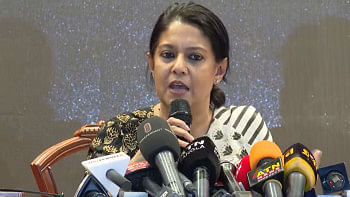Blood Stained Elections A Failed Democracy

Photos: Star File
Two men lying on the ground were helplessly trying to save their own lives. Their heart-wrenching cry for help was getting lost in the noise of the crowd, who were beating them mercilessly with bamboo sticks and wooden planks. One of the victims appealed to the mob to spare his life and asked for some water but the marauding mob of six or seven men did not pay any heed. Rather with a huge bang on the head they finished the man off and within a few minutes they also flogged the other victim to death.
This brutal incident happened at Pabna during the recent union council election. Indifferent bystanders videoed this brutal murder and uploaded it on social media but nobody came forward to save the victims. It is very hard to believe that these two men were killed this way only because they had worked during the election for the opposing party. However, this kind of unprecedented brutal violence happened all over the country during the local government elections, which for the first time in Bangladesh, was held under the ticket of political parties.
In the post-poll violence at Pirojpur district's Mothbaria upazila, five people were killed and hundreds of people were injured during a deadly clash between two rival parties. The actions of the law enforcers to disperse the angry mob were no less brutal. Indiscriminate shooting at the mob by the law enforcers killed a further eleven people. In two days of the first phase of the union council election from March 21 to March 23, 2016 twenty one people were already killed.

Amidst such unrestrained violence, the second phase of the election started on March 31, 2016. It was no different than the first phase. Another seventeen people were killed in the election clash and hijacking ballot boxes; occupying polling centres with armed party cadres were frequent. The consequence of such violence was also reflected in the result. In the two phases of the union council election, candidates of the ruling party Awami League got 50.96 percent votes whereas its archrival BNP got only 19 percent votes. In many constituencies, candidates of Awami League got more than 90 percent votes whereas their rivals got less than 5 percent or even zero votes.
Irregularities in Bangladeshi elections was never uncommon, however, such large scale, uncontrollable violence where the law enforcers shot and killed people indiscriminately, is really unprecedented. Only in two phases of the Union council election, thirty six people were killed and thousands of people all over the country were seriously injured, losing all their belongings in the deadly clashes and arson attacks. However, as usual, the chief election commissioner Kazi Rakibuddin Ahmad said that they found only a few incidents of irregularities in these elections. Without any pragmatic plan to stop this mayhem, the election commission is going to launch the third phase of the union council election on April 23.
In the recent years, elections in Bangladesh have been stained with violence, arsons, murders, loss of property and explicit irregularities. According to a report of The Electoral Integrity Project commissioned by University of Sydney, Australia and Harvard University, USA, in the ninth general election held on January 5, 2014, twenty one people were killed, over 100 polling centres were set on fire and voting was suspended in more than 300 polling centres due to violent conflicts. In the following year, the political alliance which boycotted the general election started a movement in protest which killed hundreds of innocent people by the deadly Molotov cocktail attacks. Mayoral elections of Dhaka North and South City corporations held in April 28, 2015, were also no exceptions.
Article 11 of our constitution has clearly ratified Bangladesh as a democratic country. However, in the recent years, the main pillar of democracy – elections – has become a meaningless exercise. Recent clashes in the local government elections reflect that people in the very root level of our country have lost faith in this process and that our election commission is incapable of controlling such explosive situations which are serious threats for the democratic future of Bangladesh.


 For all latest news, follow The Daily Star's Google News channel.
For all latest news, follow The Daily Star's Google News channel. 



Comments